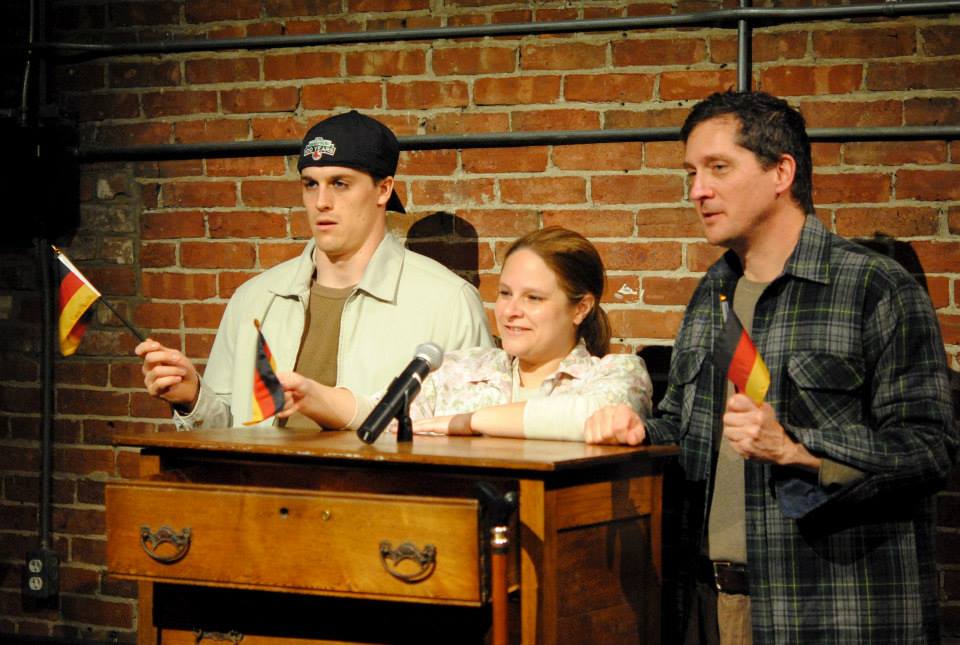
Photo Credit: Josephine Anes; photo chosen specifically for its derp factor.
Presented by Happy Medium Theatre Co.
By Israel Horovitz
Directed by Brett Marks
May 9 – 23, 2014
The Factory Theater
Boston, MA
Happy Medium on Facebook
Featuring: R. Nelson Lacey, Audrey Lynn Sylvia, Michael Underhill
Review by Kitty Drexel
Trigger Warning: Nazis, Holocaust, Death, Violence, Microaggressions, Gloucester references
(Boston) “Lebensraum” literally translated means “living space.” For the Nazis, it was local colonialism, an expansion of territory in order to displace inferior people. It is based on the manifest destiny principle*.
Lebensraum, the drama, is about the world reaction to a German Chancellor’s televised invitation to the Jewish community to return to Germany. It has a tender love story, media hype and politics to poke your eye out. While the events of the script are not real, the characters’ reactions to the fictional events are. Horovitz’s script is striking because, were the events of the show to actually occur, they would likely occur as they do in his script. His argument is convincing and his psychology is sound. Horovitz has analyzed the human population and found us territorial, racist and surprisingly resilient. It is horrifying to know that while we teach the Holocaust in history, humans have learned almost nothing from it.
This production led by director Brett Marks, is simple but stunning. The cast, R. Nelson Lacey, Audrey Lynn Sylvia, and Michael Underhill adapt remarkably well to the complex script with the use of clever costumes and props. Their physical acting is exceptional even if their accent work falters… Except for Lacey. His accents were spot on. Lacey gave equal amounts charm, severity, and depth to even the smallest of his characters. His was the prize winning performance of the evening.
Lebensraum is similar in structure to The Laramie Project (parts 1 and 2). It intends to make a messy historical event more personal to the people learning of it after the fact. Characters give interviews and tell their stories to give greater context to tragedy that most sane people would prefer to remain impersonal. Matthew Shepard was a boy who lived and died. Germany was the location of the Holocaust.
My Grandpa Adam was drafted in WWII for the Nazi party. (Bear with me, I’ll get to the point in a second.) He lived in Austria and was able-bodied. He was a reluctant Nazi. I discovered shortly before his funeral several years ago that he defected to avoid death. He travelled from Germany to Hungary, at night, on foot, sleeping in barns, to escape detection. His story is incredible but, until I watched Happy Medium Theatre’s production of Lebensraum, it was incomplete.
Adam was a charming man. He appreciated pretty women, a good beer, and freshly pressed shirts. He was my Grandpa and I love(d) him. Yet, Lebensraum brings into stark focus one very important fact that my family chooses to gloss over when they tell his defection story: Adam didn’t defect because he disagreed with Hitler. No, Adam defected to save his own life after he had already served as a Nazi soldier.
While that doesn’t make him a bad man – it was an impossible time, after all, and I have no idea what his duties were – it does reveal much about his character. Adam, like many men and women from 1939 to 1945, chose the best option available and then convinced himself that he was doing the best he could. That meant blatantly ignoring the intolerable cruelty happening around them. We are all doing “our best” in this life and usually what we do isn’t. I sincerely hope that watching Lebensraum enables the audience member to consider the impact their choices have. For example, I am still responsible for correcting the terrors my Grandfather didn’t stop even though I’m not to blame for them. We are responsible for making the world a better place because our forefathers didn’t, wouldn’t or couldn’t.
*One could argue that the whole mess was our fault really.
